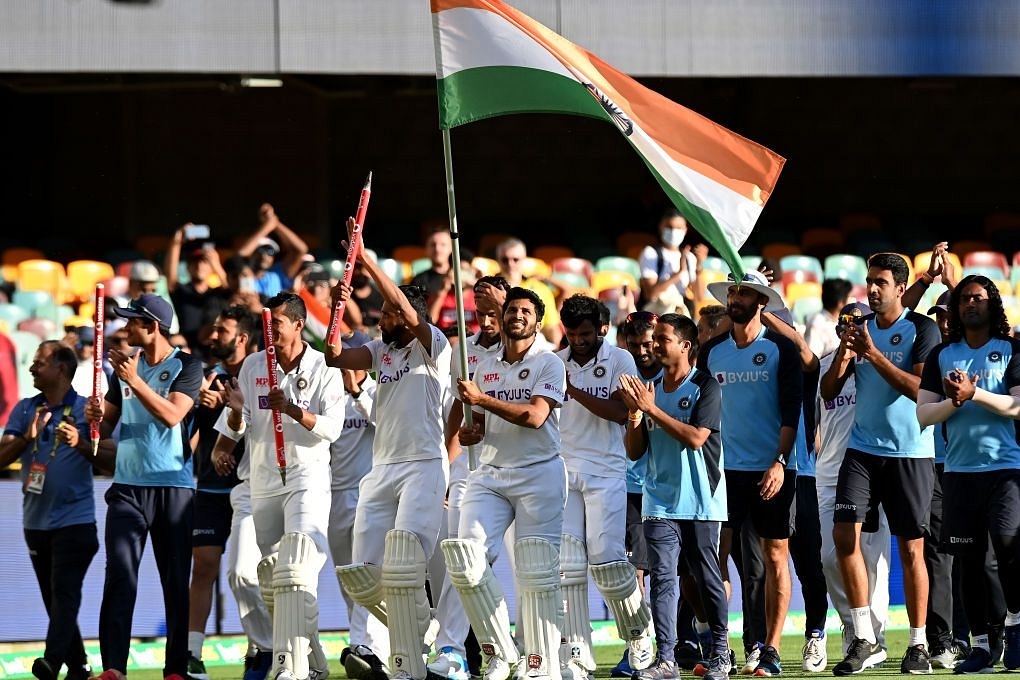Sports
Main Lesson From Cricketing Win In Australia: India Can And Should Field More National Teams
- The moral of the story: India should not – and has no need to – put all its cricketing eggs in one basket.

The Indian team celebrates.
The spectacular win of the Indian cricket team Down Under – where they not only reversed a disastrous defeat in the first Test match but also pulled off two other victories and ensured a nail-biting draw in one so as to retain the Border-Gavaskar Trophy – should actually prompt us to think more cricket teams, more national teams.
India is a sub-continent of 1.38 billion people, and once you add the numbers in Bangladesh and Pakistan, it should be obvious to anyone that the future of the game is in our sub-continent and not in London or Melbourne. So, to artificially restrict the number of participating teams to just one national team is doing disservice to the game.
The fact is India is capable of producing at least 5-10 national teams of good quality that can compete with at least the lower half of the global cricket league, which now includes Zimbabwe, Kenya, Bangladesh, Sri Lanka and West Indies.
More importantly, having many national teams ensures that our so-called national squad does not get undue attention – which is the surest way to ego-driven selections and unexpected defeat.
In Adelaide, India were all out for a humiliating 36, and it was only after that that the new squad, under Ajinkya Rahane, took us from the depths of despair to exhilarating success.
The moral of the story: India should not – and has no need to – put all its cricketing eggs in one basket.
If a team lead by Rahane – dubbed India’s A team and not the national team – can defeat Australia in Australia and throw up new heroes in Shubman Gill, Rishabh Pant, Hanuma Vihari, T Natarajan, M Siraj, N Saini and Shardul Thakur in just a few weeks’ time, just think of the huge untapped potential of India’s cricketing talent lurking in the shadows waiting for the odd opportunity so that they can catch the selectors’ eyes.
If Britain can have sub-standard squads from Scotland and Ireland, and even Canada and Holland have occasionally played international cricket, where is the logic in restricting India’s national team to just one – the one owned by the Board for Control of Cricket in India (BCCI).
The BCCI’s best idea in decades was to launch the Indian Premier League (IPL), which too was the result of competition from Zee owner Subhash Chandra’s Indian Cricket League (ICL). But while ICL folded up very quickly as Chandra was unwilling to put in the big bucks needed to make it a success, today there is no lack of investors who would gladly own a team and nurture it towards success.
Mukesh Ambani, Shak Rukh Khan and the Marans all own good teams that can – at least some times – take on the national team and win.
Logically, the International Cricket Council, if it wants to really promote the game, should open up membership to not only national teams, but also corporate and other teams so that there is stronger competition and more interest in the game.
There is no reason why we should not have an India XI, a Bharat XI and a Hindustan XI, or, for that matter, a Mumbai XI or Hyderabad XI or Delhi XI and Bangalore XI, all competing in the international sweepstakes.
Yes, this will raise hackles among backers of other sport, including badminton, kabaddi, tennis, wrestling, shooting or football, but if Indians prefer to watch cricket rather than these games, and advertisers and sponsors see better traction in cricketing heroes, market sense suggests that this is what we must do.
The 80-20 rule says that at any point, 20 per cent of the people will own 80 per cent of resources or profits or – in this case – eyeballs. If cricket is the 20 per cent game that generates 80 per cent of viewership and bang for the advertiser’s buck, why try and pretend that this is not good?
We must learn to listen to what the market for sport is telling us, not try and force people to think that this is somehow wrong.
Support Swarajya's 50 Ground Reports Project & Sponsor A Story
Every general election Swarajya does a 50 ground reports project.
Aimed only at serious readers and those who appreciate the nuances of political undercurrents, the project provides a sense of India's electoral landscape. As you know, these reports are produced after considerable investment of travel, time and effort on the ground.
This time too we've kicked off the project in style and have covered over 30 constituencies already. If you're someone who appreciates such work and have enjoyed our coverage please consider sponsoring a ground report for just Rs 2999 to Rs 19,999 - it goes a long way in helping us produce more quality reportage.
You can also back this project by becoming a subscriber for as little as Rs 999 - so do click on this links and choose a plan that suits you and back us.
Click below to contribute.
Latest